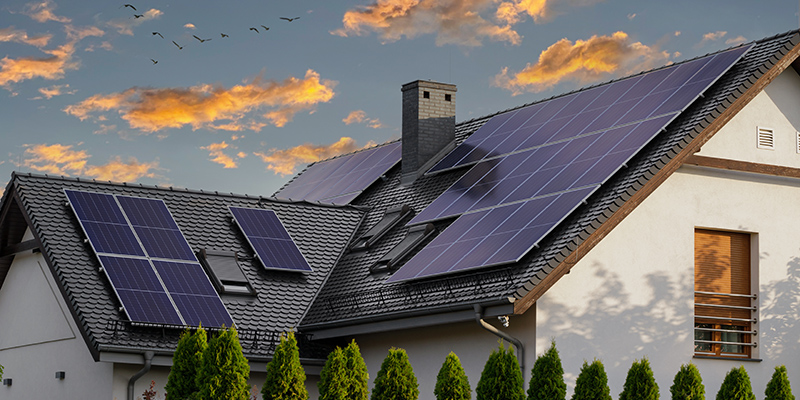Solar panels are an eco-friendly and affordable energy source homeowners can use to power their homes. However, while they provide many benefits, installing solar panels in HOA communities can be tricky. Homeowners must understand state law and follow specific rules to avoid being penalized by the HOA.
Solar Panels in HOA: Do I Need HOA Approval for Solar Panels?
First things first: can an HOA deny solar panels? If you’ve lived in a planned community before, chances are you know the consequences of making architectural changes without HOA approval. Often, it results in penalties and having to remove the thing you’ve already constructed.
With that in mind, are there rules for solar panels for homeowners association communities? Can the Declaration of Covenants, Conditions, and Restrictions (CC&Rs) prohibit them entirely? Unfortunately, this question has no straightforward answer as it depends on the HOA’s location. Certain states have laws that limit an HOA’s ability to impose restrictions on solar panels. Meanwhile, some states have no such laws and provide the HOA free rein.
In addition, it’s important to review the governing documents to verify precisely what the HOA can and cannot allow. These two factors—state law and the governing documents—determine whether homeowners can install HOA solar panels.
HOA Solar Law
 As of the time of writing, no federal law protects homeowners’ rights to install solar panels in HOA communities. In 2009, the American Clean Energy and Security Act aimed to do just that on a national level. Homeowners associations would not have been able to enforce rules that prohibited solar panel installation. However, it did not pass.
As of the time of writing, no federal law protects homeowners’ rights to install solar panels in HOA communities. In 2009, the American Clean Energy and Security Act aimed to do just that on a national level. Homeowners associations would not have been able to enforce rules that prohibited solar panel installation. However, it did not pass.
As such, homeowners must turn to state solar access laws for legal protection. Two solar access rights protect people’s ability to install solar infrastructure: solar access laws and easements.
Solar Access Laws
In some states, solar access laws limit restrictions on installing HOA solar panels. This means that, legally, the association cannot prohibit homeowners from installing solar infrastructure on their property. However, these laws still allow HOAs to restrict the way homeowners install their solar panels.
For example, the homeowners association might require flush-mounted panels and prohibit ground-mounted solar panels. Some HOAs may also prevent homeowners from installing panels on rooftops visible from major roads. These rules preserve the HOA’s aesthetic uniformity and enhance curb appeal. However, they also make installation costly and cumbersome for many citizens.
Regardless, homeowners should check the specific solar access laws in their state. Regulations may vary as some states have more exhaustive laws than others. For instance, California has enacted a Solar Rights Act that limits the authority of HOAs to prevent solar installations. The Solar Shade Control Act also prohibits tree branches from casting shades over solar panels.
Meanwhile, the Texas Property Code Section 202.010 allows HOAs to regulate where and what kind of solar panels homeowners can install. Homeowners associations can also prohibit solar devices during the development period of a residential neighborhood with less than 51 units.
Solar Easements
Laws on HOA solar infrastructures protect your installation rights, while solar easements safeguard people’s right to access sunshine. If the state has solar easement regulations, homeowners can ask their neighbors to limit obstructions to sunlight. They can negotiate anything that might cast shade on their solar panels, such as trees and sheds.
However, solar easements are considered a voluntary act. They are not considered law, so they must be done in writing. Homeowners must write a thorough description of where the easement must exist. It must include the dimensions of the easement, including height restrictions. In addition, solar easements may consist of termination conditions, compensation for easement maintenance, and fees for easement violations.
Exceptions to Solar Laws
Most solar access laws include exceptions to the rule. For instance, historic districts can usually reject solar panel infrastructure as they can change the neighborhood’s notable character. However, some landmark districts may still allow solar panels if they’re hidden from public view.
As a homeowner, reviewing the solar access laws and exceptions in your state is vital. The rules may vary per location, so it’s good to familiarize yourself with local laws before you install solar energy devices.
No State Protections: Can You Still Install Solar Panels?
If you live in a state without solar access laws, you can still use solar technology. It’s worth noting that while some locations don’t have state-wide legislation, many towns and cities still have local policies that protect homeowners. Look into these policies and ask a lawyer to help you understand what you can and cannot do.
Apart from this, it’s best to check your HOA bylaws and CC&Rs to understand the association’s rules. Many will allow solar panels as long as they follow specific guidelines. However, if the HOA prohibits solar devices entirely, it may be worth convincing the board why solar panels benefit the community. Solar panels allow people to save money, ultimately reducing the number of delinquencies. Moreover, they increase property values and positively impact the environment.
If others in your community share your sentiments, consider banding together and convincing the board as a group. With enough people on board, the HOA may even be able to amend the governing documents to allow solar panels.
Some homeowners associations may be okay with alternative technologies, such as solar shingles, if all else fails. This will provide some of the benefits of solar panels without significantly impacting neighborhood aesthetics.
How to Get Permission
 Even with state laws in place, homeowners association solar panels can still be restricted by most HOAs. As long as the restrictions are reasonable and given authority by the governing documents, the HOA can still control what homeowners can do.
Even with state laws in place, homeowners association solar panels can still be restricted by most HOAs. As long as the restrictions are reasonable and given authority by the governing documents, the HOA can still control what homeowners can do.
Typically, the HOA will have an application and approval process in place. Homeowners will need to submit a detailed application for their desired solar installation, which must follow the restrictions within state law and the governing documents. The Architectural Review Committee (ARC) will then review these architectural requests and have the board approve them.
Undergoing this process may be difficult as solar installations are technical and often require extensive knowledge of the technology. Hence, it may be helpful to gain assistance from your solar panel provider. Many solar panel companies assist homeowners in making sure their purchases are in line with HOA guidelines.
Good for Everyone
Solar panels in HOA communities are good for everyone. They provide financial and environmental benefits for residents and homeowners associations. However, HOAs may still place certain restrictions to preserve aesthetic appeal. Understand state law and your HOA’s rules before installing solar devices.
Condo Manager is a HOA management software streamlining operations for self-managed communities and HOA management companies. Give us a call at (800) 626-1267 or reach out to us online to book a demo!
RELATED ARTICLES:
- Drainage Problems In HOA: What To Do?
- Enforce HOA Parking Rules To Avoid Parking Issues In Your Neighborhood
- Can An HOA Restrict Security Cameras?



